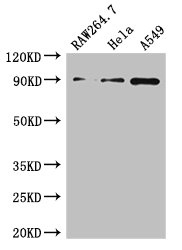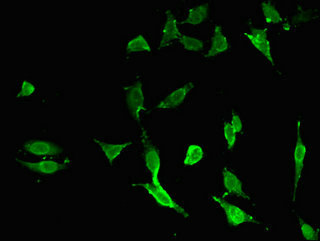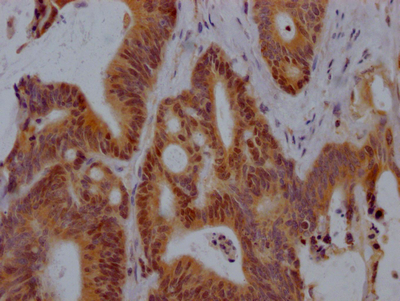TNFAIP3 Antibody
-
货号:CSB-PA023958LA01HU
-
规格:¥440
-
促销:
-
图片:
-
Western Blot
Positive WB detected in: RAW264.7 whole cell lysate, Hela whole cell lysate, A549 whole cell lysate
All lanes: TNFAIP3 antibody at 2.7µg/ml
Secondary
Goat polyclonal to rabbit IgG at 1/50000 dilution
Predicted band size: 90 kDa
Observed band size: 90 kDa -
Immunofluorescent analysis of Hela cells using CSB-PA023958LA01HU at dilution of 1:100 and Alexa Fluor 488-congugated AffiniPure Goat Anti-Rabbit IgG(H+L)
-
-
其他:
产品详情
-
产品名称:Rabbit anti-Homo sapiens (Human) TNFAIP3 Polyclonal antibody
-
Uniprot No.:P21580
-
基因名:
-
别名:A20 antibody; AISBL antibody; MGC104522 antibody; MGC138687 antibody; MGC138688 antibody; OTU domain containing protein 7C antibody; OTU domain-containing protein 7C antibody; OTUD7C antibody; Putative DNA binding protein A20 antibody; Putative DNA-binding protein A20 antibody; TNAP3_HUMAN antibody; TNF alpha-induced protein 3 antibody; TNFA1P2 antibody; TNFAIP 3 antibody; TNFAIP3 (A20) antibody; TNFAIP3 antibody; Tumor necrosis factor alpha induced protein 3 antibody; Tumor necrosis factor alpha-induced protein 3 antibody; Tumor necrosis factor induced protein 3 antibody; Tumor necrosis factor inducible protein A20 antibody; tumor necrosis factor, alpha-induced protein 3 antibody; Zinc finger protein A20 antibody
-
宿主:Rabbit
-
反应种属:Human, Mouse
-
免疫原:Recombinant Human Tumor necrosis factor alpha-induced protein 3 protein (97-183AA)
-
免疫原种属:Homo sapiens (Human)
-
标记方式:Non-conjugated
本页面中的产品,TNFAIP3 Antibody (CSB-PA023958LA01HU),的标记方式是Non-conjugated。对于TNFAIP3 Antibody,我们还提供其他标记。见下表:
-
克隆类型:Polyclonal
-
抗体亚型:IgG
-
纯化方式:>95%, Protein G purified
-
浓度:It differs from different batches. Please contact us to confirm it.
-
保存缓冲液:Preservative: 0.03% Proclin 300
Constituents: 50% Glycerol, 0.01M PBS, PH 7.4 -
产品提供形式:Liquid
-
应用范围:ELISA, WB, IF
-
推荐稀释比:
Application Recommended Dilution WB 1:2000-1:10000 IF 1:50-1:200 -
Protocols:
-
储存条件:Upon receipt, store at -20°C or -80°C. Avoid repeated freeze.
-
货期:Basically, we can dispatch the products out in 1-3 working days after receiving your orders. Delivery time maybe differs from different purchasing way or location, please kindly consult your local distributors for specific delivery time.
相关产品
靶点详情
-
功能:Ubiquitin-editing enzyme that contains both ubiquitin ligase and deubiquitinase activities. Involved in immune and inflammatory responses signaled by cytokines, such as TNF-alpha and IL-1 beta, or pathogens via Toll-like receptors (TLRs) through terminating NF-kappa-B activity. Essential component of a ubiquitin-editing protein complex, comprising also RNF11, ITCH and TAX1BP1, that ensures the transient nature of inflammatory signaling pathways. In cooperation with TAX1BP1 promotes disassembly of E2-E3 ubiquitin protein ligase complexes in IL-1R and TNFR-1 pathways; affected are at least E3 ligases TRAF6, TRAF2 and BIRC2, and E2 ubiquitin-conjugating enzymes UBE2N and UBE2D3. In cooperation with TAX1BP1 promotes ubiquitination of UBE2N and proteasomal degradation of UBE2N and UBE2D3. Upon TNF stimulation, deubiquitinates 'Lys-63'-polyubiquitin chains on RIPK1 and catalyzes the formation of 'Lys-48'-polyubiquitin chains. This leads to RIPK1 proteasomal degradation and consequently termination of the TNF- or LPS-mediated activation of NF-kappa-B. Deubiquitinates TRAF6 probably acting on 'Lys-63'-linked polyubiquitin. Upon T-cell receptor (TCR)-mediated T-cell activation, deubiquitinates 'Lys-63'-polyubiquitin chains on MALT1 thereby mediating disassociation of the CBM (CARD11:BCL10:MALT1) and IKK complexes and preventing sustained IKK activation. Deubiquitinates NEMO/IKBKG; the function is facilitated by TNIP1 and leads to inhibition of NF-kappa-B activation. Upon stimulation by bacterial peptidoglycans, probably deubiquitinates RIPK2. Can also inhibit I-kappa-B-kinase (IKK) through a non-catalytic mechanism which involves polyubiquitin; polyubiquitin promotes association with IKBKG and prevents IKK MAP3K7-mediated phosphorylation. Targets TRAF2 for lysosomal degradation. In vitro able to deubiquitinate 'Lys-11'-, 'Lys-48'- and 'Lys-63' polyubiquitin chains. Inhibitor of programmed cell death. Has a role in the function of the lymphoid system. Required for LPS-induced production of proinflammatory cytokines and IFN beta in LPS-tolerized macrophages.
-
基因功能参考文献:
- Analysis of postmortem brain tissue and CSF of multiple sclerosis (MS) patients revealed that expression of A20/TNFAIP3, as well as the expression levels of IL-1beta and NLRP3 were significantly increased in MS plaques. PMID: 29789522
- LIFR-AS1 serves as a competitive endogenous RNA for miR-29a to inhibit its expression and up-regulate downstream target TNFAIP3 expression, finally modulating the resistance of colorectal cancer to pohotodynamic therapy. PMID: 29807108
- Study demonstrates evidence of the constitutive expression of A20 in macrophages, its role in supporting the differentiation program, and the functional consequences of the zinc finger domains thereof. PMID: 28771803
- A20 dimers bind linear ubiquitin to stabilize the Ripoptosome and potentiate its apoptosis-inducing activity. PMID: 30209212
- At least in the subcutaneous fat of humans and mice, the levels of PGC-1a decrease during obesity, while its physical association with A20 increases. PMID: 29678181
- Results suggest a clinicopathologic implication of A20 in progression of NKTL. PMID: 29380463
- Studied effect of temperature on gene expression regulation by NF-kappabeta on TNF alpha induced protein 3 (A20) transcription. PMID: 29760065
- TNFAIP3 abnormality was less prevalent among intestinal diffuse large B-cell lymphomas with some discordancy between gene deletion and protein expression. PMID: 29463935
- antidepressant treatment exerts anti-inflammatory effects, at least in part through increased expression of the TNFAIP3 gene PMID: 27640899
- A20 regulates canonical wnt-signaling through an interaction with RIPK4 PMID: 29718933
- these results suggested that in human colorectal cancer cells, A20 may function to inhibit cancer progression via down-regulation of TNFalpha-induced chemokine production by suppression of ERK signaling PMID: 29175508
- Low A20 expression is associated with HIV disease. PMID: 29505600
- A20 overexpression in vivo significantly reduced renal injury as demonstrated by the improved levels of Scr and BUN and the reduction in histological damage. PMID: 29067462
- the risk allele for the TNFAIP3 rs2230926 polymorphism was associated with systemic lupus erythematosus susceptibility. PMID: 29783072
- It was concluded that the A20 protein in macrophages modulates lung injury induced by LPS. The overexpression of A20 in macrophages may be involved in modulating macrophage polarization. PMID: 28791391
- TNF phase III signalling displays ongoing TNFR1/NF-kappa B activation in monocytic cells. High- and low-sensitive genes are induced including differentially regulated A20. A20 strictly controls this signalling in an IKK- and partially RIP-dependent manner. The A20-mediated control mechanisms are supported by ABIN1 and CYLD. PMID: 28629782
- A20 is a negative regulator of inflammation in human myometrium and foetal membranes. PMID: 28911210
- The tandem polymorphisms (rs148314165, rs200820567), deletion T followed by a T to A transversion and collectively referred to as TT > A variant of TNFAIP3 may be associated with the susceptibility of chronic hepatitis B virus infection but not the clinical disease. PMID: 28784141
- elevated A20 expression is involved in the severity of chronic hepatitis B PMID: 28473659
- The results of this study confirmed that the A20 expression is reduced in whole blood of Multiple Sclerosis patients as compared to healthy control. PMID: 28337659
- C/EBP beta LAP isoform expression was increased and LIP/TNFAIP3/TNIP1 expression was decreased in systemic lupus erythematosus (SLE) patients. LAP expression was positively correlated with SLE disease activity; TNFAIP3 and TNIP1 expression was negatively correlated with SLE disease activity. PMID: 27659348
- A20 may have a role in the progression of chronic HBV infection PMID: 27634895
- A20 overexpression inhibits hepatic stellate cell activation, which could be the mechanism for high A20 expression protected livers from fibrosis. PMID: 28251449
- The data demonstrate that miR-125b regulates nasopharyngeal carcinoma cell proliferation and apoptosis by targeting A20/NF-kappaB signaling pathway, and miR-125b acts as oncogene, whereas A20 functions as tumor suppressor. PMID: 28569771
- we demonstrate that a pathological reduction in TNFAIP3 levels induced NF-kappaB/SMAD7 pathway activation, causing a deficiency in MSCs in ITP patients. The ability of ITP-MSCs to support megakaryocytic differentiation and thrombopoiesis of CD34(+) cells was impaired. PMID: 29327472
- miR-125b regulates differentiation and reprogramming of T cell glucose metabolism via targeting A20 in T cell acute lymphoblastic leukemia. PMID: 27637078
- Review/Meta-analysis: TNFAIP3 gene rs10499194, rs13207033 polymorphisms decrease the risk of rheumatoid arthritis, especially among Caucasian populations. PMID: 27779104
- In vitro deletion of A20 in B cells compromised the expression of IL10. PMID: 27825134
- Low A20 expression is associated with hepatocellular carcinoma. PMID: 26909601
- The results suggest that TNFAIP3 polymorphisms (rs2230926, rs5029937, rs5029939, and rs3757173) are associated with susceptibility to systemic lupus erythematosus. (Meta-analysis) PMID: 27726311
- Hepatitis C virus core protein ligates gC1qR to induce A20 expression in macrophages via P38, JNK and NF-kappaB signaling pathways, which leads to a low-grade chronic inflammation during HCV infection. PMID: 27183919
- Results show that TNFAIP3 expression is regulated by miR-19b through targeting its 3'-UTR which contributes to the radioresistance of nasopharyngeal carcinoma and consequently activating the NF-kappaB pathway. PMID: 27919278
- demonstrates that TNFAIP3 gene polymorphisms (rs2230926 and rs5029937) are associated with the increased risk of rheumatoid arthritis. [META-ANALYSIS] PMID: 28888761
- CHN1 and TNFAIP3 are candidate biomarkers for esophageal squamous cell carcinomas PMID: 27072986
- These results identify the ubiquitin-editing enzyme A20 as a novel endogenous mechanism for negative regulation of fibrotic response intensity PMID: 27716397
- Our data propose an additional novel mechanism to explain the known NF-kappaB inhibitory effects of A20: by affecting p105 ubiquitination and subsequently its degradation and limited processing. PMID: 28923245
- A20 promotes metastasis of aggressive basal-like breast cancers through multi-monoubiquitylation of Snail1. PMID: 28892081
- Low TNFAIP3 expression is associated with colitis-associated colorectal cancer. PMID: 27991929
- The miR-17-92 is a critical contributor to CML leukemogenesis via targeting A20 and activation of NF-kappaB signaling. PMID: 28461114
- IM could upregulate A20 protein to inhibit the activation of NF-kappaB pathway in Jurkat T cells, which was independent of the ABIN1 protein. PMID: 28502291
- this meta-analysis confirms that TNFAIP3 gene polymorphisms may play important roles in the pathogenesis of Rheumatoid arthritis PMID: 28199970
- Report a significant association between the biased usage of IGHV4-34 (binds to the carbohydrate I/i antigens) and inactivating mutation of TNFAIP3 [encoding a global negative regulator of the canonical nuclear factor-kappaB (NF-kappaB) pathway] in ocular adnexal MALT lymphomas. PMID: 28682481
- reduced expression confers susceptibility to psoriasis PMID: 28658319
- Haploinsufficiency of TNFAIP3 (A20) by a germline heterozygous mutation leads to the autoimmune lymphoproliferative syndrome (ALPS) phenotype. PMID: 27845235
- These results suggested that A20 is involved in regulating intracerebral hemorrhage-induced inflammatory injury in both the central and peripheral system PMID: 27986908
- In targeted sequencing, a disruptive mutation of TNFAIP3 was the most common alteration (54%), followed by mutations of TBL1XR1 (18%) and cAMP response element binding proteins (CREBBP) (17%). PMID: 28152507
- the DNA fragment containing the associated SNPs interacts through chromatin looping not only with TNFAIP3, but also with IL20RA, located 680 kb upstream. PMID: 27799070
- The findings suggest that TNFAIP3 protein may be an independent prognostic marker for poor survival, and a promising target for esophageal squamous cell carcinoma therapy. PMID: 28197630
- Study demonstrates that the rs7749323 in the TNFAIP3 gene is strongly associated with the late onset myasthenia gravis(with positive AChR Ab but without thymoma). PMID: 28514294
- Influenza a virus NS1 has a role in inducing A20 contributes to viral replication by suppressing interferon-induced antiviral response PMID: 27914808
显示更多
收起更多
-
相关疾病:Autoinflammatory syndrome, familial, Behcet-like (AISBL)
-
亚细胞定位:Cytoplasm. Nucleus. Lysosome.; [A20p50]: Cytoplasm.
-
蛋白家族:Peptidase C64 family
-
数据库链接:
HGNC: 11896
OMIM: 191163
KEGG: hsa:7128
STRING: 9606.ENSP00000237289
UniGene: Hs.211600
Most popular with customers
-
YWHAB Recombinant Monoclonal Antibody
Applications: ELISA, WB, IF, FC
Species Reactivity: Human, Mouse, Rat
-
Phospho-YAP1 (S127) Recombinant Monoclonal Antibody
Applications: ELISA, WB, IHC
Species Reactivity: Human
-
-
-
-
-
-























